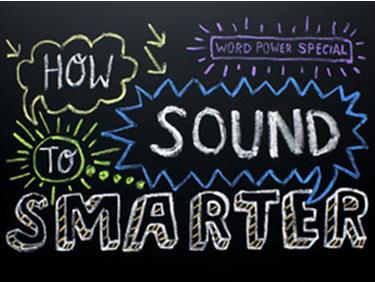Author Resources
Grammar Rules: How to Sound Smarter
Think you know how to talk real good? Test yourself: These grammar rules will surprise even the experts.
By Paul Silverman and Sarah Wharton from Reader's Digest Magazine

Illustration by Timothy Goodman
In this world of OMG and autocorrect, does grammar stand a chance? Below, our guide to the most confounding rules will restore your love of language.
ROOT RIVALRY
You never mean: preventative
You always mean: preventive
Why: Grammar sovereign H. W. Fowler banned the long form almost a hundred years ago. So someone who is health conscious might seek preventive care; responsible homeowners might take preventive measures to keep their roof from leaking.
You almost never mean: infamous
You almost always mean: famous
Why: The rich and famous are widely known (and wealthy). But the rich and infamous have a reputation of the worst kind (… and money, which doubtless has dubious origins). Another way to look at it: Unless Aunt Donna’s chocolate chip cookies are notoriously evil and disgraceful, they are famous, not infamous.
You might say: evoke
You might mean: invoke
Why: A photograph evokes emotion; a joke evokes laughter—evoke means “to elicit or call forth.” Save invoke for when you mean “to call on a higher power, petition for support, or implement” (for example, “Allison invoked Robert Frost for her first assignment” or “The principal invoked the aid of the teachers”).
You might say: denounce
You might mean: renounce
Why: The two may sound similar, but their meanings are distinct: Denounce is “to condemn publicly or accuse formally” (“The judge denounced the CEO for insider trading”), while renounce means “to give up or refuse to follow” (“The CEO renounced his not-guilty plea”).
You might say: uninterested
You might mean: disinterested
Why: Careful speakers who wish to convey a lack of bias want to use disinterested. Speakers who don’t care about such grammatical subtleties are uninterested.
Grammar 101
You never mean: “Jane, Andrew, and myself are going…”
You always mean: “Jane, Andrew, and I are going…”
Why: Myself is notoriously misused for I or me, often because people are trying (too hard, it seems) to sound smarter (wrong: “My husband and myself have belonged to the country club for years”). Myself is a pronoun best reserved for reflexive uses (when an action is directed toward the subject: “For Christmas, I gave myself a gift”) or for emphasis (“I myself have done that many times”).
You might say: former
You might mean: latter
Why: The difference is clear-cut, yet writers and speakers sometimes muff these two: Simply, former is the first of two; latter is the second. (And while we’re at it, formerly vs. formally: The former means “at an earlier time,” as in “Formerly the governor of California, Schwarzenegger …”; the latter means “by an established form or structure,” as in “The school is formally called the University of California at Los Angeles.”)
You almost never mean: neither/either are
You almost always mean: neither/either is
Why: Both neither and either are singular pronouns and should take a singular verb. Confusion sets in when the verb appears far from its subject or when a plural object falls after it: “Turns out, neither of the usually mischievous dogs were [read: was] responsible for tearing up the pillows; the cat wast to blame.”
CONFUSED & MISUSED
You never mean: fall between the cracks
You always mean: fall through the cracks
Why: Logically speaking, you can’t fall between an opening; you fall into or through it. As such, don’t let logic fall through the cracks when you use this idiom.
You might say: mute
You might mean: moot
Why: Moot‘s most common meaning is “deprived of practical significance.” Mute means silent. So while they might want to be mute about a moot point, careful speakers will be vocal about the difference.
You almost never mean: just desserts
You almost always mean: just deserts
Why: When you want someone to get what he deserves, you hope he reaps his just deserts. But on her birthday, a particularly well-behaved three-year-old might be allowed in just desserts.
You never mean: modern-day
You always mean: modern
Why: Quite simply, modern covers it. Modern-day is a redundant term. Modern speakers will sound smarter by using the superior word.
You might write: so-called “good grammar”
You mean to write: so-called good grammar
Why: So-called introduces a term as falsely, improperly, or commonly referred to as something. So by default, it covers the need for quotation marks (or a speaker’s air quotes).
SHADES OF MEANING
You might say: exuberant
You might mean: exorbitant
Why: While both mean “extreme,” the terms are often confused in relation to money. Exuberant refers to unrestrained enthusiasm or flamboyance; exorbitant means “exceeding an appropriate amount.” Another way to look at it: Exuberant use of a credit card leads to an exorbitant bill down the road.
You might say: come
You might mean: go
Why: Come refers to movement toward the speaker (Henri says, “Come to Paris!”); go denotes the opposite (After you’ve stayed two months, Henri says, “You should go”). But idiomatic use sometimes clouds this rule, as “I’ll come over” is more comprehensible than “I’ll go over.”
You might say: jealous
You might mean: envious
Why: Great grammarian Bryan Garner reminds us that “jealousy connotes feelings of resentment toward another, particularly in matters relating to an intimate relationship,” while “envy refers to covetousness of another’s advantages, possessions, or abilities.” So your ex is jealous of your new boyfriend but envious of your ability to use these two terms correctly.
Article provided by Trusted Media Brands, Inc.
By clicking “Request My Free Consultation”, you are providing your electronic signature, voluntarily authorizing LifeRich Publishing and its affiliates to contact you using a manual or automated telephone dialing system and send you advertisement or telemarketing messages by email or text/SMS/MMS message to the address and phone number you have provided above. You are not required to agree to this in order to buy products or services from Balboa Press. You certify that you are over the age of eighteen (18). You’ll get up to ten (10) messages per month. Standard message and data rates may apply. Click here to view our privacy policy.




